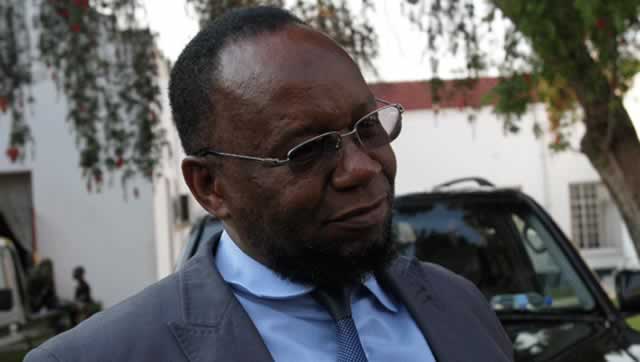Perfect rain season gone, experts say

Jeffrey Gogo Climate Story
The perfect rain season is gone, and in its place now stand imperfect, unpredictable and volatile seasons due to climate change, experts say.
And farmers are better advised to stop expecting that “perfect rain season” as in the past, according to Dr Leonard Unganai, a climate change and agriculture expert with the UN Development Programme (UNDP).
This way they can plan better, he said, produce improved yields and avoid the pitfalls of unforeseen climate and weather extremes such as the drought and flash flooding from last summer.
“Yes, the rainfall season was not one of the best,” Dr Unganai said, in view of the 2014-15 farming season, now known to have failed and left thousands of families in most parts of the country in need of food aid.
“But I think farmers should never expect a perfect season. With climate change, things can even get worse. Despite the ‘poor rainfall pattern’ there are a number of farmers that are likely to have a good harvest this season. The question then should be, ‘what did those farmers do differently?”
In the past, rainfall may not have been necessarily perfect, but was more predictable and less variable. Smallholder farmers had a good understanding of when the rains begun and when they ended.
However, precipitation has declined 5 percent across Zimbabwe in the last 50 years owing to climate change, according to the Meteorological Services Department, causing significant crop failure.
Those that did things differently last cropping season helped save 85 percent of the food crops, but could not prevent the certainty of food shortages, which Government plans cover through imports.
Those smallholder farmers who carried on business-as-usual when faced with flash flooding and long mid-season dry spells did not know what to do, and gave up their crops as weeds took control.
“This meant the limited soil moisture farmers had was going towards supporting weeds instead of crops,” Dr Unganai said, by email.
“The point is — the farmer can make a huge difference between a good and poor harvest. Farmers that did well this season got a number of things right — they managed their soil moisture and soil fertility well, planted on time and kept their crops weed free.
“Those with access to irrigation or on soils with high water holding capacity also had an advantage. But you also need other support systems to work well — such as markets and finance services.”
Adaptation Under Threat
With climate change, safety can never be guaranteed. Even those crops built to resist extremes are failing. Pastures are depleted.
Last summer, small grains failed in the low-rainfall provinces of Masvingo, Midlands and Matabeleland South, by margins of up to 70 percent, in some instances, according to Government estimates. Usually, they perform better in those regions.
That is the emerging challenge to climate adaptation, and one which the UN Expert Panel on Climate Change warned of in its Fifth Assessment Report last year.
“This might also show that there are a number underlying drivers of vulnerability in these regions that require urgent attention,” said Dr Unganai.
And then again, he poses a question that begs an answer, an honest one. Certainly not from me.
“Have we invested enough in irrigation development, grazing systems management, land management, markets and financial services and population pressure in fragile ecosystems such as Natural Regions IV and V?” Dr Unganai asks.
Zimbabwe has built dozens of small and large dams, mainly to support irrigation. But irrigation, a key tool for adaptation, remains poor for a lot of reasons.
Eventually, he answers himself. “As the President (Mugabe) has been suggesting, the country also needs to continually revisit its agriculture and land policy with a view to achieving sustainable food security,” Dr Unganai said.
“Farming is a serious business that requires resources, skill and passion, supported by well functioning market and financial services systems. Without finance farmers cannot acquire inputs on time and consequently may miss out on timing their operations appropriately.”
Dr Unganai spearheaded the “Coping with Drought” project in Chiredzi, a multi-faceted climate-resilience building programme jointly implemented by Government and the UNDP a few years ago.
Today, he is leading a new project in rural Chimanimani, Buhera and Chiredzi on scaling up climate change adaptation. Dr Unganai has experienced the good, the bad and the ugly of agriculture in a changing climate. He more than likely knows what he is talking about.
Limited Climate Information
To make adaptation work, farmers need reliable climate and weather data.
But severe spending cuts at the State-run Meteorological Services Department have left farmers throughout most of rural Zimbabwe without access to such crucial information, which can help farmer understanding of micro-climates, and minimise crop failure.
Only a quarter of the country’s 1 400 weather stations are currently operational, due to neglect, Juliet Gwenzi, meteorologist at the University of Zimbabwe, told a national climate policy workshop in Harare last September.
Zimbabwe’s four weather radars reached the end of their 30-year lifespan a decade ago and have not worked since. Replacing them will cost $12 million.
Today, the Meteorological Office, whose budget was cut 25 percent from 2014 levels, to $2,9 million in 2015, tends to produce vague and generalised information for entire provinces, say for Mashonaland Central, which consists of dozens of large districts with differing climates.
That is helping no one. “We are stressing the need for timely, reliable information to further strengthen resilience,” Mr Washington Zhakata, director for climate change in the Environment, Water and Climate Ministry, said in a statement to mark the World Meteorological Day last week, celebrated every March 23.
“Thousands of lives may be saved around the country by improved weather forecasting, early warning systems and disaster readiness.”
He said his department had started looking for global funding “. . . to contribute towards strengthening the capacity to generate new forms of empirical knowledge, technologies and agricultural support services. . .”
God is faithful.
[email protected] <mailto:[email protected]











Comments